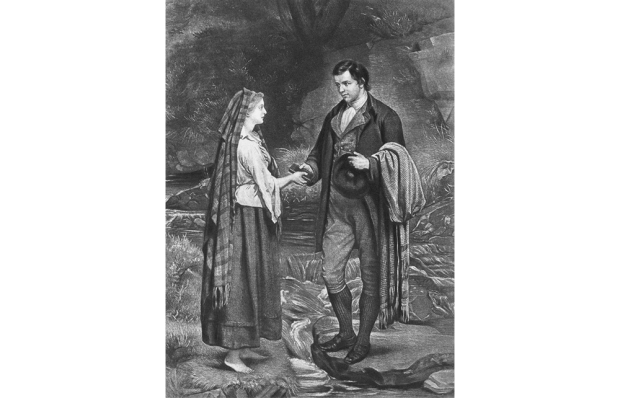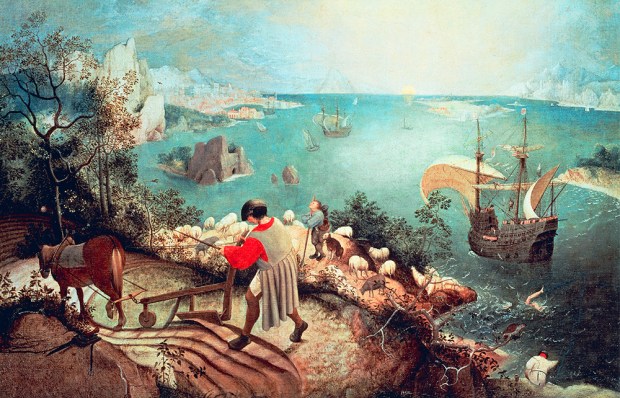In Competition No. 3287, you were invited to supply a review of a film, novel, poem or play in the style of a writer for whom the theme might be deemed an appropriate choice. Thanks to Philip Stevens for suggesting this terrific challenge, which attracted a sizeable and stellar entry. Honourable mentions to Moray McGowan’s Kafka on The Very Hungry Caterpillar (‘There is a story here, but it needs something more radical, perhaps even wildly implausible, to make it more realistic.’), Chris O’Carroll’s T.S. Eliot on James and the Giant Peach and Russell Chamberlain’s Jeremy Clarkson on Chitty Chitty Bang Bang. In an especially hotly contested week, the winners below snaffle £25 apiece.
Yestreen I was allowed back to the earth,
And in a darkened room, upon a screen,
Were moving coloured pictures of a play
About two warring families! ’Twas mine,
A copy, right, but still they had the right,
Since I am centuries past copyright.
We are translated to th’Americas,
And their new Juliet is quite mature.
Mine was not yet fourteen, a fact for which
I oft have suffered censure – but I had
To cast a boy with an unbroken voice,
But songs! Maria! There’s a place for us!
Tonight, tonight! No tedious monologues!
I’faith, I lived too soon! The film’s the thing!
I wish I’d let my star-crossed lovers sing!Brian Murdoch/Shakespeare: West Side Story
I’ve been asked to put the Wooster pen to paper and comment on this play by a chap called Orton. What the Butler Saw. Dashed misleading, if you ask me. In spite of the promise in the title, there’s no mention of any fine fellow of the Jeeves variety. Seems we’re in a clinic, they’re all off their rocker and half of them haven’t got any clothes on. The psychiatrist chappie seems a bit of a wolf in sheep’s clothing. (‘Precisely the ungulate I had in mind,’ said Jeeves.) What did he make of it then? His reply, ‘As I see it, sir, it’s a farcical glimpse into an anarchic situation exposing the greed, sexuality and violence of middle-class English life. A satire on sexual hypocrisy and corruption…’
A whiff of incomprehension clouds the Wooster brow. Nevertheless, gentle reader, I offer you this interpretation. It’s what my butler saw.
Sylvia Fairley/Wodehouse: What the Butler Saw
A fastidiousness regarding matters antiquarian pertains in my supernatural stories which I found lacking in Sam Raimi’s cinematic presentation The Evil Dead. His quintet of undergraduates, holidaying at a cabin in the Tennessee woods, upon discovering a Book of the Dead, proceed to recite incantations therefrom before properly establishing the texts provenance or place in the occult canon. Standards in the United States naturally lack Cambridge rigour, but I nevertheless felt unsympathetic to the subsequent sufferings of the students, whether at the hands of trees claiming excessive intimacy, invisible demons or their own chainsaw-wielding, undead limbs. A frenetic cinematic style deployed to hold my attention failed in its task; I remained troubled throughout that the Book remained uncatalogued and in hands both amputated and unappreciative. A bachelor would make a more scrupulous protagonist in a film which is a warning to the incurious.
Adrian Fry/M.R. James: The Evil Dead
In Finding Nemo, the fish has salao, bad luck. He fears the sea, la mar. The fish lost his wife. A barracuda killed her. Marlin, the fish, has deep wrinkles on his forehead. His son has a small fin. Marlin does not grow wise, he grows careful. That is the way of widowers. A diver takes the son. Marlin pursues him. It is what a father must do. He meets a female fish, the colour of the sea, cheerful and undefeated. ‘Just keep swimming,’ she says. The sea, they learn, is often stressful and always painful. They meet a shark that repents of its ferocity. Blood arouses its true nature. They encounter iridescent bubbles which are jellyfish and the falsest things in the sea. They meet a wise turtle. They speak to a whale. The son escapes. Marlin finds him. The son loves his Papa. The journey is what matters.
Janine Beacham/Hemingway: Finding Nemo
Had a spectator been present, in the scriptorium rather than during the broadcast, he might fairly have intervened out of charity. For it is a melancholy truth that parody, so long tolerated as the sport of those who glister in the London’s lime-lit wastes, is yet not to be mistaken for travesty. Alas for Miss Blyton, who toiled in Corfe and the adjacent coast (which she named Kirrin), and whose amusing young tyros are here transformed into toffee-nosed oiks of the meanest calibre, traitors to their class as to the Eternal Presence. It cannot be denied that Miss Blyton’s healthy adventurers are voracious in the consumption of sausages, eggs, and carbonated beverages. But all other resemblance to the intrepid Five is elsewise discarded. The narrative is etiolated. The script is puerile. The betrayal of Uncle Quentin is absolute. A shadow has fallen over Wessex, and our furzes are wilfully discordant.
Bill Greenwell/Thomas Hardy: Five Go Mad in Dorset (The Comic Strip)
This important book, though purporting to be a work of fiction, offers a compelling instance of the climate catastrophe that faces us all. It develops themes introduced in one of the author’s earlier works, which detailed the extinction of the rare pink rabbit, Cuniculus rubescens, as a direct result of European militarisation.
Here the subject is the tiger, Panthera tigris, which we see forced by loss of habitat in its Asian heartlands to migrate to more northerly latitudes for its very survival. We encounter it foraging for sustenance in a typical suburban street, subsisting on a diet for which it is poorly adapted.
Yet even here, in as stark a scenario as could be imagined, the very taps run dry. And, in the final, chilling paragraph, it is abundantly clear that the local population’s attempt to marshal slender resources against the visitor’s possible return is too little, too late.
David Shields/David Attenborough: The Tiger Who Came to Tea
No. 3290: let us pray
You are invited to recast the Lord’s Prayer as a sonnet. Please email entries of up to lucy@spectator.co.uk by midday on 8 March.
Got something to add? Join the discussion and comment below.
Get 10 issues for just $10
Subscribe to The Spectator Australia today for the next 10 magazine issues, plus full online access, for just $10.
You might disagree with half of it, but you’ll enjoy reading all of it. Try your first month for free, then just $2 a week for the remainder of your first year.














Comments
Don't miss out
Join the conversation with other Spectator Australia readers. Subscribe to leave a comment.
SUBSCRIBEAlready a subscriber? Log in